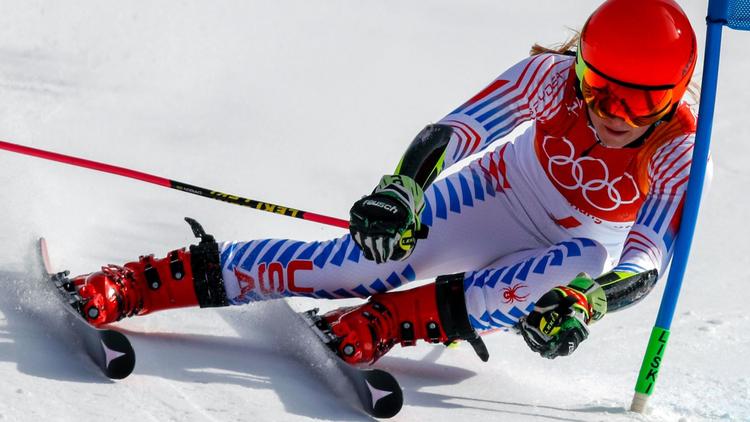
By Nancy Armour |
Mikaela Shiffrin got more than a couple of medals at the Pyeongchang Olympics.
She got a dose of perspective that might make her even more formidable in the future.
Shiffrin is notorious for her preparation and perfectionism. It’s part of what makes her one of the best technical skiers her sport has ever seen, winner of five of the last six slalom season titles as well as the last two overall crowns.
But things don’t always go according to plan. Like, say, when blustery winds delay races for days on end and wreak havoc with an already compressed schedule.
While her competitors were able to roll with the uncertainties in Pyeongchang, Shiffrin acknowledges she got worked up by them. She threw up before her first slalom run and came out of the gate tentative, winding up fourth in her signature event.
Fourth place at the Olympics is hardly something to apologize for, and Shiffrin still came home with two medals, a gold in the giant slalom and a silver in the combined. Add her slalom gold from the Sochi Games and she’s just the fourth American skier with three or more Olympic medals, and the youngest to accomplish the feat.
Yet Shiffrin knows she let herself be beaten in Pyeongchang by the only person who can: Herself.
“I look back with fond memories, but I also kind of cringe because I just felt like I was nervous the entire time I was there. That’s something I’m trying to realize and really accept, the fact that there are some things that are out of my control,” she said during a trip here in September for work with some of her sponsors.
“Watching some of my competitors and how they handled the weather delays and whatnot and somehow gained energy out of it because they were just like, ‘Oh, it’s the Olympics. This is fun. My work is done, I’m here to just race now,’” Shiffrin added. “I was like, ‘I need to train, I need to get this stuff done, I need to make sure all my ducks are in order.’
“At the end of the day, in the slalom, it still didn’t help.”
When Shiffrin thinks back to Pyeongchang, some of her favorite memories are the time she spent with her dad, brother and her brother’s girlfriend — time she wouldn’t have had if the schedule hadn’t been upended.
“That was a really nice, bring me back down to the earth, those moments. I really enjoyed that,” she said. “So I have actually looked back at South Korea not even for the medals or whatever disappointment I may have felt, but more for those moments that made me feel I’m OK, everything’s fine.”
It’s a feeling she’s trying to hold onto as she begins this season with this weekend’s giant slalom race in Soelden, Austria.
Shiffrin is always going to be a stickler for preparation and training. That’s just who she is. She also knows adding more speed events to her schedule will bring additional stress because it means memorizing new courses and finding her way around new venues.
And then there is the spotlight, which will focus even more intensely on the 23-year-old now that Bode Miller has retired and Lindsey Vonn has announced this will be her last season.
“I’m probably never going to give up that mindset that I have to make sure I’m trained, make sure that I’m prepared,” Shiffrin said. “But I’m finding a way to enjoy it a little bit more.”
She mentions the two-week vacation she and boyfriend Mathieu Faivre took this spring, a time that she might normally otherwise spent hunkered down in the gym. Also on the trip was Tessa Worley, a teammate of Favire’s on the French squad who just happens to be one of Shiffrin’s biggest competitors.
And it was fine. More than fine, in fact.
“That was really nice for me to see,” Shiffrin said. “It was eye-opening, in a way. Just realizing that (you) can be competitors … but you can be friends. You can be friendly.
“I very much have been very focused, intense, I-have-to-get-myself-in-a-specific-mindset-in-order-to-perform,” she added. “And sometimes it feels like it’s going against who I am as a person because I tend to just want to be happy.”
And therein lies the lesson from Pyeongchang. You can prepare for everything. Sometimes, though, the best preparation is simply realizing you’re just going to have to let it all ride.
This article was republished with permission from the original author and 2015 Ronald Reagan Media Award recipient, Nancy Armour, and the original publisher, USA Today. Follow columnist Nancy Armour on Twitter @nrarmour.